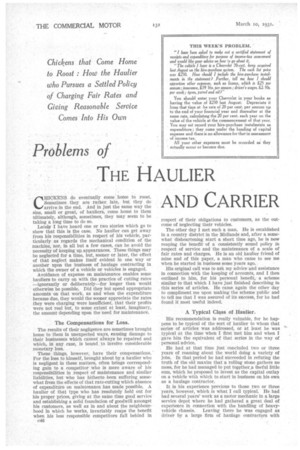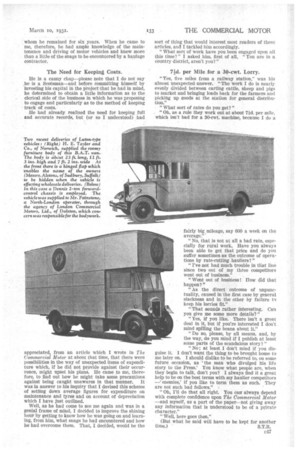Problems of
Page 68

Page 69

If you've noticed an error in this article please click here to report it so we can fix it.
THE HAULIER
AND CARRIER
CHICKENS do eventually come home to roost. Sometimes they are rather late, but they do arrive in the end. And in just the same way the sins, small or great, of hauliers, come home to them ultimately, although, sometimes, they may seem to be taking a long time to do so.
Lately I have heard one or two stories which go to show that this is the case. No haulier can get away from his responsibilities in respect of his vehicle, particularly as regards the mechanical condition of the machine, nor, in all but a few cases, can he avoid the necessity of keeping up appearances. These things may be neglected for a time, but, sooner or later, the effect of that neglect makes itself evident in one way or another upon the business of haulage contracting in which the owner of a vehicle or vehicles is engaged.
Avoidance of expense on maintenance enables some hauliers to carry on with the practice of cutting rates —ignorantly or deliberately—for longer than would otherwise be possible. Did they but spend appropriate amounts on that work, as and when the expenditure became due, they would the sooner appreciate the rates they were charging were insufficient, that their profits were not real but, to some extent at least, imaginary, the amount depending upon the need for maintenance.
The Compensations for Loss.
The results of their negligence are sometimes brought home to them in unexpected ways, causing damage to their businesses which cannot always be repaired and which, in any case, is bound to involve considerable monetary loss. .
These things, however, have their compensations. For the loss to himself, brought about by a haulier who is negligent in these matters, often brings corresponding gain to a competitor who is more aware of his responsibilities in respect of maintenance and similar liabilities, but who has hitherto been suffering somewhat from the effects of that rate-cutting which absence of expenditure on maintenance has made possible. A haulier of that type who has resolutely held out for his proper prices, giving at the same time good service and establishing a solid foundation of goodwill amongst his customers, as well as in and about the neighbourhood in which he works, invariably reaps the benefit when his less responsible competitors fall behind in
c443 respect of their obligations to customers, as the outcome of neglecting their vehicles.
The other day I met such a man, He is established in a country district in the Midlands and, after a somewhat disheartening start a short time ago, he is now reaping the benefit of a consistently sound policy in respect of service and the maintenance of a scale of fair rates and charges. He is an old haulier friend of mine and of this paper, a man who came to see me when he started in business some years ago. _ His original call was to ask my advice and assistance in connection with the keeping of accounts, and I then outlined to him, for his personal benefit; a scheme similar to that which I have just finished describing in this series of articles. He came again the other day to compliment me upon making the scheme public and to tell me that I was assured of its success, for he had found it most useful indeed.
A Typical Class of Haulier.
His recommendation is really valuable, for he happens to be typical of the sort of haulier to whom that series of articles was addressed, or at least he was typical at the time when I first met him and when I gave him the equivalent of that series in the way of personal advice.
He had at that time just concluded two or three years of roaming about the world doing a variety of jobs. In that period he had succeeded in refuting the truth of the old maxim that a rolling stone gathers no moss, for he had managed to put together_a Neful little sum, which he proposed to invest as the capital outlay on a vehicle with which to start in business on his own as a haulage contractor.
It is his experience previous to those two or three years, however, which is what I call typical. He had had several years' work as a motor mechanic in a large service depot where he had gathered a great deal of experience in connection with the handling of heavyvehicle chassis. Leaving there he was engaged as driver by a large firm of haulage contractors with • whom he remained for six years. When he came to me, therefore, he had ample knowledge of the maintenance and driving of motor vehicles and knew more • than a little of the snags to be encountered by a haulage contractor.
The Need for Keeping Costs.
He is a canny chap—please note that I do not say he is a Scotsman—and before committing himself by investing his capital in the project that he had in mind, he determined to obtain a little information as to the clerical side of the business in which he was proposing to engage and particularly as to the method of keeping track of costs.
He had already realized the need for keeping full and accurate records, but (or so I understood) had appreciated, from an article which I wrote in The Commercial Motor at about that time, that there were possibilities in the way of unexpected items of expenditure which, if be did not provide against their occurrence, might upset his plans. He came to me, therefore, to find out how he might take some precautions against being caught unawares in that manner. It was in answer to his inquiry that I devised this scheme of setting down average figures for expenditure on maintenance and tyres and on account of depreciation which I have just outlined.
Well, as he had come to see me again and was in a genial frame of mind, I decided to improve the shining hour by getting to know how he was going on and learning, from him, what snags he had encountered and how he had overcome them. That, I decided, would be the sort of thing that would interest most readers of these articles, and I tackled him accordingly.
"What sort of work have you been engaged upon all this time?" I asked him, first of all. "You are in a country district, aren't you?"
71d. per Mile for a 30-cwt. Lorry.
"Yes, five miles from a railway station," was his almost unexpected answer. "The work I do is nearly evenly divided between carting cattle, sheep and pigs to market and bringing loads back for the farmers and picking up goods at the station for general distribution."
"What sort of rates do you get?"
"Oh, as a rule they work out at about 7-1d. per mile, which isn't bad for a 30-cwt. machine, because I do a fairly big, mileage, say 600 a week on the average."
"No, that is not at all a bad rate, especially for rural work. Have you always been able to get that price and do you suffer sometimes as the outcome of operations by rate-cutting hauliers?"
"I've not had much trouble in that line since two out of my three competitors went out of business."
"Went out of business I How did that happen?"
"As the direct outcome of unpunctuality, caused in the first case by general slackness and in the other by failure to keep his lorries Eft." "That sounds rather interesting. Can you give me some more details? '
"Yes, if you like. There isn't a great deal in it, but if you're interested I don't mind spilling the beans about it."
"Do so, please, by all means, and, by the way, do you mind if I publish at least some parts of the scandalous story?"
"No; at least I don't mind if you disguise it. I don't want the thing to be brought home to me later on. I should dislike to be referred to, on some future occasion, as 'the man who divulged his life story to the Press.' Yon know what people are, when they begin to talk, don't you? I always find it a great help to be on the best terms with my haulier competitors enemies,' if you like to term them as such. They are not such bad fellows."
" Oh, I'll do that all right. You can always depend with complete confidence upon The Commercial Motor —and myself, ELS a part of the paper—not giving away any information that is understood to be of a private character."
"Well, here goes then."
(But what he said will have to be kept for another time.) ' S.T.R.
• c47












































































































